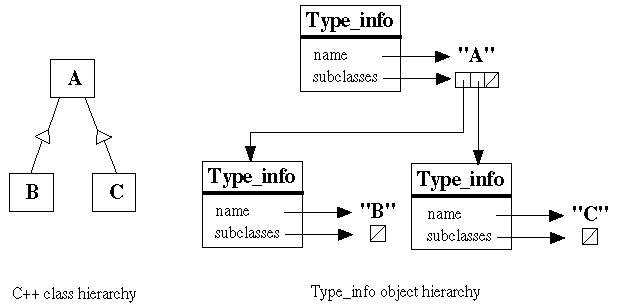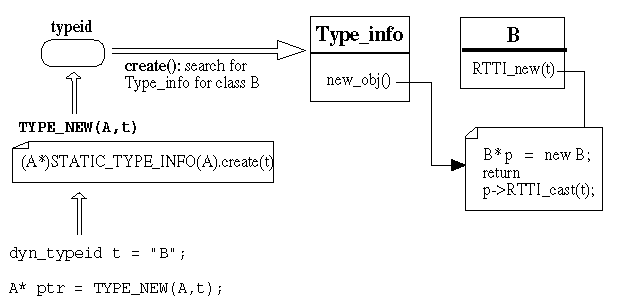
Figure 6: Type_info implementation support for run-time object creation
The last operation to be implemented is run-time object creation. As described, this operation creates an object of a type specified at run-time by a typeid. In a certain sense, it can be seen as a run-time equivalent of the C++ new operator.
The macro TYPE_NEW which implements run-time object creation needs two parameters. One of them is a typeid t for the type T we want to instantiate. The other one is a C++ class name of a base class B of T. The second parameter is necessary since we have to return the newly created object as a typed object. In other words, TYPE_NEW(B,T) will create a new T and return it as a B*.
The implementation of the TYPE_NEW RTTI operation which performs this task has to add one extra piece of information. Namely, the RTTI system has to maintain a repository of all application classes (more exactly, of all Type_infos of all application classes). When a TYPE_NEW operation is requested, the type to be instantiated is looked up in this repository and, if found, is instantiated.
The proposed solution is to implement this repository in a 'distributed' fashion. Rather than keeping a centralized list of all types of an application, the idea is to let each Type_info know about all types directly derived from it (similarly to the way a Type_info knows about its bases)(Figure 6). This solution fits well the previous description of the TYPE_NEW operation: when TYPE_NEW(T,t) is invoked, the typeid t will be searched in the inheritance graph rooted at T downwards

Figure 6: Type_info implementation support for run-time object creation
Keeping information about derived types inside each Type_info object offers a faster way to locate the existence of a type to be instantiated at run-time than the centralized repository version. Indeed, in the case the information about subclasses is kept locally in each Type_info, the system must only scan the inheritance path starting at the root type specified in the TYPE_NEW operation. If the system kept a 'flat' list with all Type_infos of an application, the worst case search would mean traversing the whole list.
After finding the right Type_info, the system should create a new instance
of its corresponding C++ class. In ordr to do this, it has to call the
C++ new operator passing the C++ class as argument. This can not
be done generically for the same reason which forbade us casting C++ pointers
generically, namely the lack of 'real' type variables in C++. Moreover,
we can't use virtual constructors since the C++ classes the RTTI system
should manage do not always have a common base. The only available solution
is to declare a static method in each C++ application class which returns
a new object of that type. However this is only half of the solution since
we should return the new object as a pointer cast to the typeid argument
supplied to TYPE_NEW. The solution is to use the method ![]() introduced in Section 5.2.5 on
the newly created object, passing it the typeid to cast to.
introduced in Section 5.2.5 on
the newly created object, passing it the typeid to cast to.

Figure 7: Example of run-time object creation
In the example presented in Figure 7,
class B inherits from A. The steps of the user request to create a B and
return in as an A* are outlined. First, the Type_info for B is searched
in the graph rooted at A (by a method of Type_info called create()).
When this Type_info is found, the creation static method of class B (i.e.
B::RTTI_new())is retrieved from the Type_info. This implies that a Type_info
for a class has to store a pointer (called here ![]() )
to the object creation method RTTI_new of the class it represents. When
this method is called, a B is allocated on the heap and it is returned
as a pointer cast to the typeid of A. Finally, TYPE_NEW will properly cast
the void* returned by
)
to the object creation method RTTI_new of the class it represents. When
this method is called, a B is allocated on the heap and it is returned
as a pointer cast to the typeid of A. Finally, TYPE_NEW will properly cast
the void* returned by ![]() to an A* (which is safe since RTTI_cast produced an A*).
to an A* (which is safe since RTTI_cast produced an A*).
Marginal cases include trying to instantiate non-existing classes (in
which case ![]() will fail to find the respective Type_info and will return NULL) or trying
to instantiate classes which have no default constructors like abstract
classes (in which case the respective Type_info will have a NULL
will fail to find the respective Type_info and will return NULL) or trying
to instantiate classes which have no default constructors like abstract
classes (in which case the respective Type_info will have a NULL ![]() member so will simply return NULL when asked to instantiate its class).
member so will simply return NULL when asked to instantiate its class).